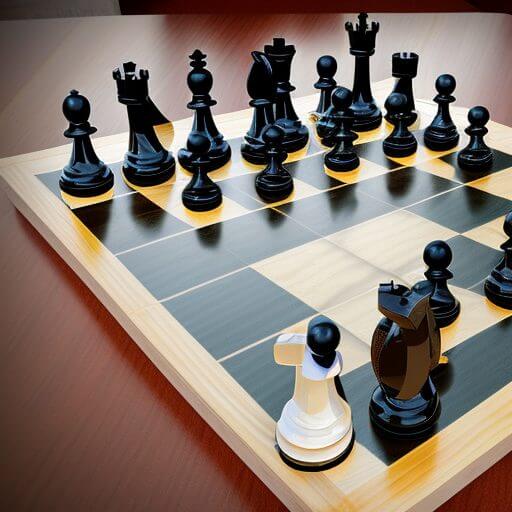15 Strategy Games That Will Make You a Better Student

Strategy games such as Chess, Go, Settlers of Catan, Risk, Stratego, and Blokus can help improve study skills in many ways. Firstly, they require critical thinking and problem-solving skills. Players must think several steps ahead to anticipate their opponent’s moves and outsmart them.
This type of analysis requires complex logic and reasoning skills, which are transferable to the academic realm. Secondly, strategy games also teach players emotional control and flexibility in decision-making. To win these games, one must stay calm even when under pressure from an opponent.
This discipline is essential for successful studying since it helps one remain focused on the task at hand despite distractions or setbacks. Lastly, strategy games hone memory retention and recollection skills as one must remember patterns or strategies used by previous opponents in order to plan a winning move against a new opponent.

Similarly in academics, remembering facts or data is often key to success on tests or assignments that require recall of information.
#1 | Chess
A game of strategy and skill in which two players battle it out on a board full of pieces with each player trying to capture the other’s king.
Chess is a great tool for improving test-taking and study skills. The game requires strategic thinking, creativity, and planning ahead. Players must think several moves ahead to anticipate their opponent’s moves, which helps with developing abstract concepts.
There are various strategic moves that can be implemented during a game of Chess such as castling and sacrificing pieces to gain an advantage. By learning and understanding the mechanics of each move, players are able to strengthen their problem-solving abilities since they must think several steps ahead in order to outwit their opponents. Additionally, memorizing basic openings or strategies can greatly help with recalling information when taking tests or studying for exams.
#2 | Go
An ancient Asian game where two opponents take turns placing stones on a grid while attempting to outmaneuver their opponent.
when playing Go one must strategize by creating multiple pathways of attack while keeping control of the board. This allows players to build their decision-making capabilities as they learn how to assess risks while under pressure from an opponent.
Additionally, memory retention and recollection are improved through studying previously used strategies or patterns in order to strategize against new opponents. These skills are essential for recalling information during tests or assignments given in school or other professional fields.
#3 | Settlers of Catan
A resource management and barrier-building game where players compete to build the most prosperous settlements on the eponymous island. Playing Settlers of Catan requires players to analyze the board state ahead of their turns as well as strategize how best to utilize their resources before making a move.
This helps build problem-solving skills when facing difficult questions on exams or in daily life where they have to assess their available options and select the most beneficial course of action.
Furthermore, studying the game’s trade dynamics and resource management can improve memory recall and help players better understand concepts such as supply and demand. Players of all skill levels can benefit from this mental exercise as they become more adept at formulating solutions that take into account potential outcomes.
#4 | Risk
A classic war game between multiple players, who must use tactical prowess, diplomatic guile, and an element of luck to achieve world domination. Playing Risk requires players to think ahead in order to form a game plan that allows them to outsmart their opponents.
By studying the different dice combinations and implementing a strategy for each round, it is possible for players to improve their problem-solving abilities as well as become better at predicting future outcomes based on present conditions.
Additionally, being able to accurately assess risk when making moves can also help with memorizing information since players must be aware of potential threats from other countries in order to strategize effectively.
Through this process, they can gain an understanding of how tactical maneuvers can affect their overall chances of winning, furthering their education and study habits.
#5 | Stratego
A fast-paced tactical game in which two players deploy an array of 40 pieces in an attempt to capture their opponent’s flag. Players must analyze their opponent’s lineup and make quick decisions to protect their own pieces while attacking enemy territories.
This encourages critical thinking as they develop strategies and figure out how best to place their pieces, taking into account possible moves that the opposition has in store.
Additionally, by carefully surveying the board and anticipating an adversary’s movements, players can hone their memory recall skills as they become familiar with each piece’s strengths and weaknesses. Ultimately, playing Stratego is a great way for learners of all ages to practice strategic planning and prepare for challenging test-taking scenarios.
#6 | Blokus
A turn-based strategy board game for 2–4 players requires careful planning and spatial awareness skills as you try to fit your pieces onto the board before your opponents can do so. Blokus requires players to develop a well-thought-out strategy while simultaneously taking into account the limitations of their pieces.
Rather than relying on chance alone, they must come up with creative solutions in order to maximize their control of the board. With every move comes careful consideration, as they must be mindful of what pieces can and cannot fit into any given space.
This encourages problem-solving skills as they visualize multiple different options on how to set up their own pieces in order to take away valuable real estate from the opponents. By mastering Blokus, learners of all ages can improve their playmaking abilities and boost their confidence for future challenge scenarios.
#7 | Qwirkle
A tile-matching puzzle game where players must place tiles with various shapes and colors that match up according to certain rules in order to score points. This is all about strategic planning and clever tactical adjustments.
Players must determine how to best use their tiles to carve out colors and shapes in order to gain maximum points. They must think ahead, looking for opportunities where they can place multiple tiles at once. This encourages creativity as they come up with creative ways to get the highest possible score while working within their set of pieces.
Furthermore, by considering different geometric patterns, players may practice spatial awareness and enhance their cognitive abilities such as hand-eye coordination, math skills, and pattern recognition. Ultimately, mastering the game of Qwirkle is an excellent way to engage learners of all ages in a stimulating challenge that quickens both the mind and the fun factor.
#8 | Carcassonne
Played on a board made up of tiles depicting different landscapes, structures, roads, farms, and rivers, this is a city-building game where you must use strategic thinking to gain points as quickly as possible. Carcassonne encourages strategic planning and imaginative creativity.
Players must use tiles in order to construct a vibrant landscape in which they can build cities and roads. With careful consideration, they can claim important features such as farms and city walls that give them points at the game end. Every turn requires thought processes such as determining the sequence of playing that will best maximize their score.
Furthermore, players may come across interesting tiles that make them think of unconventional solutions on how to create more elaborate stories on the map. By learning Carcassonne, learners of all ages have the opportunity to strengthen their problem-solving abilities while also engaging in an enjoyable gaming experience.
#9 | Forbidden Island
In this cooperative adventure game, you must work together with your teammates as you explore an island while trying not to get caught by rising waters or sinister enemies! The game is all about cooperation and teamwork. Players must work together to form a plan and execute it in order to gain victory before the island is submerged by rising waters.
Every turn requires strategic decisions that take into account the other player’s moves and the constantly changing rules of the game. As players traverse the terrain, they will come across surprises that test their ability to think quickly and plan ahead, requiring them to react accordingly.
Ultimately, this engaging adventure provides learners of all ages with an excellent opportunity to develop important problem-solving skills while enjoying thrilling scenarios
#10| Pandemic
Control four diseases that have spread around the world by deploying scientists across a map grid represented by cities; find cures for all four diseases before time runs out or infection levels get too high (or both!). In Pandemic, the game is all about collaboration and resource management.
Players must work together to form an effective strategy in order to save humanity from four different diseases. Every turn requires strategic decisions that take into account the other player’s moves as well as the constantly changing rules of the game.
As players traverse the world, they will come across challenges that test their ability to think quickly and use resources wisely. Ultimately, this engaging adventure provides learners of all ages with an excellent opportunity to develop important problem-solving skills while enjoying thrilling scenarios.
#11| Ticket to Ride Europe
Players collect cards that allow them to move around a map consisting of European cities competing for tickets connecting cities – whoever fills the most tickets wins! This is another game that emphasizes planning and critical thinking. Players must form a route connecting different cities in order to gain victory points.
Every turn requires strategic decisions that take into account the other player’s moves and the constantly changing rules of the game. As players traverse through Europe, they will come across surprises that test their ability to think ahead and respond accordingly.
In the end, this engaging adventure provides learners of all ages an excellent opportunity to develop important problem-solving skills while enjoying thrilling scenarios.
#12| 7 Wonders
As one wonders from different ancient cultures, your goal is to construct monuments, develop trade routes, amass scientific knowledge and create military forces in order to become victorious! Tactical decision-making is the order of the day here.
Players must use clever tactics to gain victory points and outwit their rivals. Every turn requires strategic decisions that take into account the other players’ moves as well as the constantly changing rules of the game.
As players build ancient cities, they will come across dilemmas that test their ability to think quickly and use resources wisely. This captivating journey provides gamers with an excellent opportunity to develop important problem-solving skills while enjoying captivating scenarios.
#13| Dominion
Construct your own kingdom by acquiring resources such as land plots, gold coins, or ore mines; choose actions such as buying cards or constructing buildings; and select special bonus cards that provide powerful advantages over rival kingship! Strategic resource management is the primary objective here.
Participants must use their cards in hand to acquire more powerful cards and gain victory points. Every turn requires careful decisions that take into account the other players’ moves as well as the constantly changing rules of the game.
As players collect valuable commodities, they will come across situations that test their ability to optimize resources and outmaneuver their opponents. This engrossing journey provides gamers with an excellent opportunity to develop important problem-solving skills while studying the effects of resource redistribution.
#14| Puerto Rico
Up to 7 players compete for each turn using their colonists placed on ships at sea or into production buildings on various islands; they strive afterward towards being able to put up impressive trading houses so they can ship goods back and forth between ports in Puerto Rico itself! What makes this game so much fun is the collaborative elements and team-building even amidst the throes of competition.
Players must use their resources and buildings wisely to gain victory points and outwit their rivals. Every turn requires thoughtful execution of various strategies that take into account the other players’ moves as well as the constantly changing rules of the game.
As players construct plantations, they will come across scenarios that test their ability to use resources with maximum efficiency. This enthralling journey provides gamers with an excellent opportunity to develop important problem-solving skills while immersing themselves in the dynamics of economics and trade.
#15| Eclipse
Take control over star systems by researching new technologies, exploring alien races, and making alliances with others while taking part in conquering distant galaxies or embarking upon solo campaigns against enemies far away from home!
Playing the game Eclipse provides an excellent learning experience for those who want to improve their study habits. In this game, players must make smart decisions about resource management, in order to upgrade and expand their interstellar empire. By carefully building out fleets and researching new technologies, players can gain victory points while developing important problem-solving skills.
The rules of the game are constantly changing and require attention to detail, which forces the player to stay organized in order to maximize the potential of their chosen strategies. Playing Eclipse helps players hone both their strategic thinking and organizational skills, making it an invaluable tool for better studying.
What Strategy Games Do You Think Help Make You Smarter?
Overall, strategy games can be highly beneficial for improving study habits since they help develop important critical thinking, problem-solving, and memory retention skills that are integral to academic success.
Not only do they allow you to focus your attention on mastering abstract concepts but also help build confidence in yourself as you become increasingly adept at performing mental calculations more quickly with each game played!
Now it’s your turn, readers. What are some of the strategy games that have most helped you and made you smarter? Sound off in the comments section below.
[Featured Image Original]








